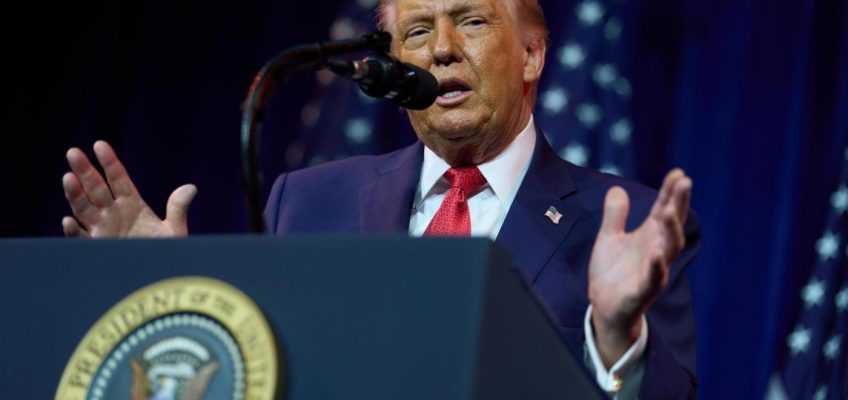President Donald Trump’s administration said Tuesday that it is withholding funding for programs that support needy families with children in five Democratic-led states over concerns about fraud.
“For too long, Democrat-led states and Governors have been complicit in allowing massive amounts of fraud to occur under their watch,” U.S. Department of Health and Human Services spokesperson Andrew Nixon said in a statement.
The administration has not laid out details of either the fraud claims or the widening plan to withhold funds, which was first reported by the New York Post.
An official in the White House budget office who has knowledge of the plan but was not authorized to speak about it publicly said that it was due to states “pouring money out” to people in the U.S. illegally.
Five states — California, Colorado, Illinois, Minnesota and New York — are targeted. The Associated Press has asked all of them, and by Tuesday afternoon, none had received notice of a broader funding pause. But Gov. Kathy Hochul said New York is prepared to go to court, as Democratic-led states have scores of times now, to block the administration.
“We’ll fight this with every fiber of our being, because our kids should not be political pawns in a fight that Donald Trump seems to have with blue state governors,” she said.
The programs in the crosshairs aim to help needy children and their families
The targeted programs provide lifelines to some of the neediest Americans:
The Child Care Development Block Grant subsidizes daycare for low-income households, enabling enabling parents to work or go to school.
Temporary Assistance for Needy Families provides cash assistance and job training so that parents in poverty can afford diapers and clothes and earn paychecks so they won’t need public assistance.
The Social Services Block Grant, a much smaller fund, supports several different social service programs.
“These resources support families in need and help them access food and much more. If true, it would be awful to see the federal government targeting the most needy families and children this way,” the office of Colorado Gov. Jared Polis said in a statement.
Trump himself has not spoken on the specifics, but he proclaimed on social media Tuesday: “The Fraud Investigation of California has begun.”
Tara Gallegos, a spokesperson for California Gov. Gavin Newsom, said in an email that “Donald Trump is a deranged, habitual liar whose relationship with reality ended years ago” and defended California’s record at stamping out fraud in government programs.
Sen. Kirsten Gillibrand, a New York Democrat, said Trump’s move to halt funding aims to score political points, not to stop fraud.
“It’s our job to serve the people most in need and most at risk — no matter what state they live in or what political party their family or elected representatives belong to,” she said in a statement. “To use the power of the government to harm the neediest Americans is immoral and indefensible.”
Trump’s administration has amplified fraud claims
For months, the Trump administration has claimed that federally funded programs are being defrauded — and using that as a rationale to hold up money.
Federal child care funding has been put on hold in Minnesota since late last month amid investigations into a series of alleged fraud schemes at day care centers run by people with family roots in Somalia.
In the fallout, HHS officials said no state will receive child care funds without providing more verification. Several states have told The Associated Press that they have not received any guidance on that decision.
The administration also raised fraud claims involving SNAP, the country’s main food aid program, saying it would halt administrative money to states — most Democratic-run ones — unless they provide requested details on recipients. That process could take months.
The administration has said the information that’s been provided by most GOP-controlled states shows fraud may be worse than previously believed, though it has not provided the data or detailed reports.
Associated Press journalists Anthony Izaguirre, Steve Karnowski, Trân Nguyễn, Todd Richmond, Colleen Slevin, Darlene Superville and Sophie Tareen contributed to this article.
Dr. Mehmet Oz, the administrator of the Centers for Medicare and Medicaid Services, told Fox News Tuesday that his agency also plans to audit Minnesota’s Medicaid bills in search of potential fraud. He didn’t provide any evidence of fraud that had been found.
A Craigslist ad seeking child actors for Minnesota day care center was posted as a prank
Trump store in suburban Philadelphia ‘kind of run its course’ and is set to close
How Delcy Rodríguez courted Donald Trump and rose to power in Venezuela
Trump’s former Russia adviser says Russia offered US free rein in Venezuela in exchange for Ukraine
FACT FOCUS: Trump sows confusion on number of childhood vaccinations




